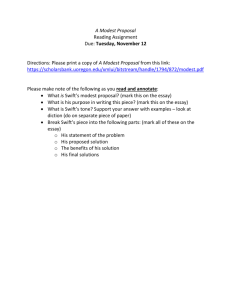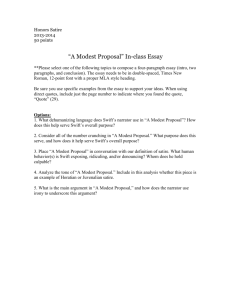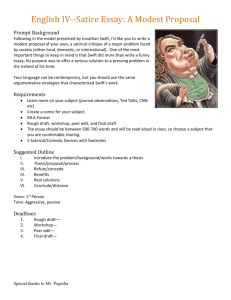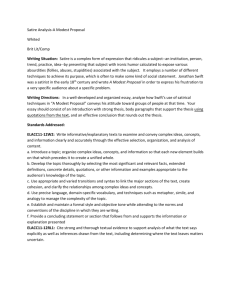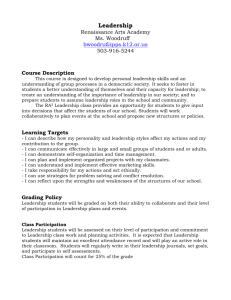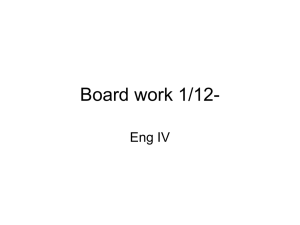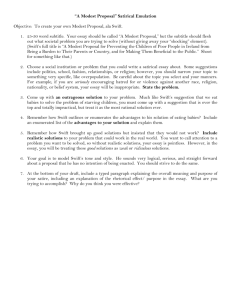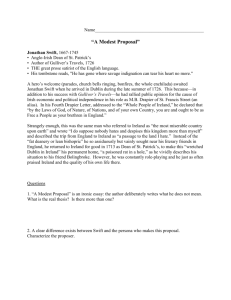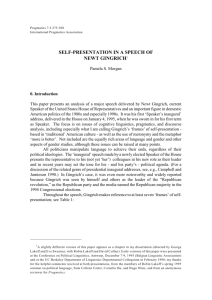10th Grade English II Reading
advertisement
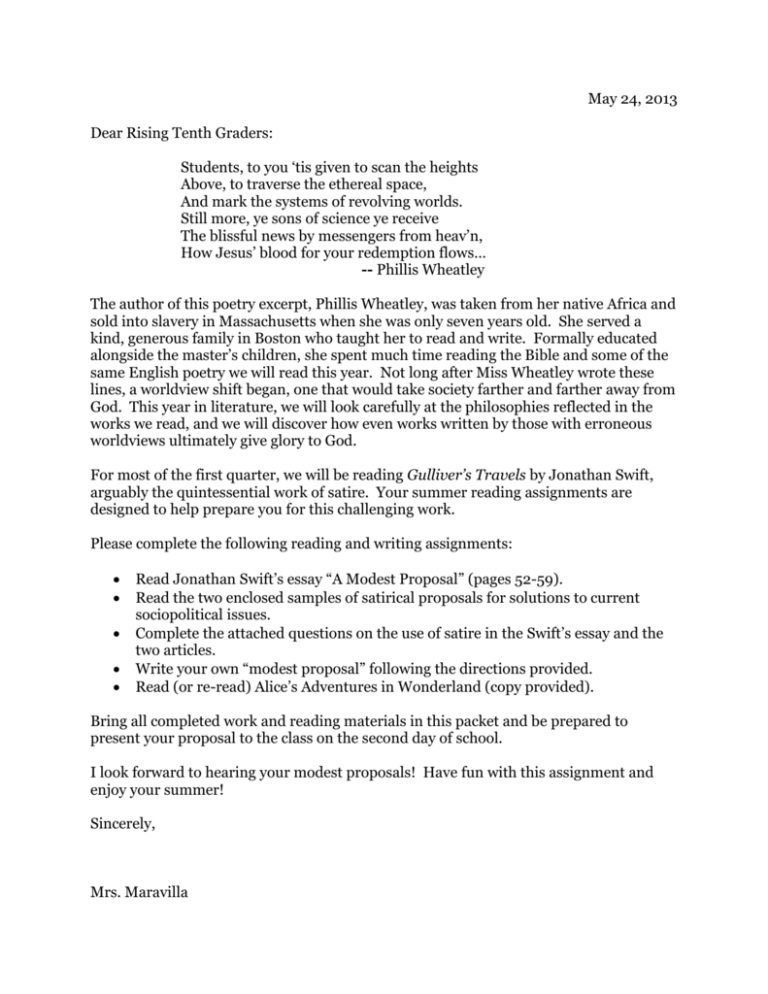
May 24, 2013 Dear Rising Tenth Graders: Students, to you ‘tis given to scan the heights Above, to traverse the ethereal space, And mark the systems of revolving worlds. Still more, ye sons of science ye receive The blissful news by messengers from heav’n, How Jesus’ blood for your redemption flows… -- Phillis Wheatley The author of this poetry excerpt, Phillis Wheatley, was taken from her native Africa and sold into slavery in Massachusetts when she was only seven years old. She served a kind, generous family in Boston who taught her to read and write. Formally educated alongside the master’s children, she spent much time reading the Bible and some of the same English poetry we will read this year. Not long after Miss Wheatley wrote these lines, a worldview shift began, one that would take society farther and farther away from God. This year in literature, we will look carefully at the philosophies reflected in the works we read, and we will discover how even works written by those with erroneous worldviews ultimately give glory to God. For most of the first quarter, we will be reading Gulliver’s Travels by Jonathan Swift, arguably the quintessential work of satire. Your summer reading assignments are designed to help prepare you for this challenging work. Please complete the following reading and writing assignments: Read Jonathan Swift’s essay “A Modest Proposal” (pages 52-59). Read the two enclosed samples of satirical proposals for solutions to current sociopolitical issues. Complete the attached questions on the use of satire in the Swift’s essay and the two articles. Write your own “modest proposal” following the directions provided. Read (or re-read) Alice’s Adventures in Wonderland (copy provided). Bring all completed work and reading materials in this packet and be prepared to present your proposal to the class on the second day of school. I look forward to hearing your modest proposals! Have fun with this assignment and enjoy your summer! Sincerely, Mrs. Maravilla NOTE: Please read this short historical background before you read “A Modest Proposal.” Over the centuries, England gradually gained a foothold in Ireland. In 1541, the parliament in Dublin recognized England’s Henry VIII, a Protestant, as King of Ireland. In spite of repeated uprisings by Irish Catholics, English Protestants acquired more and more estates in Ireland. By 1703, they owned all but ten percent of the land. Meanwhile, legislation was enacted that severely limited the rights of the Irish to hold government office, purchase real estate, get an education, and advance themselves in other ways. As a result, many Irish fled to foreign lands, including America. Most of those who remained in Ireland lived in poverty, facing disease, starvation, and prejudice. It was this Ireland—an Ireland of the tyrannized and the downtrodden—on which Jonathan Swift attempted to focus attention in “A Modest Proposal” in 1720. Summer Reading Questions 1. Were you appalled by Swift’s proposal? Why or why not? Does he reveal any reasonable solutions? If so, what are they? 2. List some examples of Swift’s sarcasm in “A Modest Proposal.” 3. What is satire? What is its goal? 4. How might satire accomplish this goal better than presenting a problem and solution in a more realistic way? 5. List any forms of satire with which you are familiar. 6. After reading the article “Put Poor Students to Work,” answer the following questions. a. Subject: What is this article about? b. Occasion: Why was it written? c. Audience: To whom is this article written? d. Purpose: What does the author hope to achieve by writing it? e. Speaker: How does the author establish herself as an authority on the subject? 7. After reading the article “Industrial Revolution Provides Millions of Out-of-Work Children with Jobs,” answer the following questions. a. Subject: What is this article about? b. Occasion: Why was it written? c. Audience: Who is this article aimed at? d. Purpose: What does the author hope to achieve by writing it? e. Speaker: How does the author establish himself/herself as an authority on the subject? Creating Your Own Modest Proposal Step 1: Think of the most debated current social or political issues. Invent an outlandish solution to one of these problems. You may need to research the issue in order to complete this assignment. Step 2: Using Swift’s essay as a model, write an essay in which you propose your outlandish solution to the problem. Notice how Swift’s essay does not reveal the “proposal” immediately. If you model your essay after his, you will: 1) build your case very persuasively, seriously offering your solution only after giving a clear description of the problem and explaining why finding a solution is critical; 2) explain why your solution is the best solution to the problem; 3) briefly refute the opposition by telling why the solutions others have proposed will not work and by pre-empting any opposition that might be brought against your proposal. Your essay should be at least two pages, double-spaced and typed in 12-point font. Please proofread and edit your paper before AND after printing. You may notice more mistakes when looking at a printed copy several hours or days after you type it. Be prepared to persuasively present your proposal to the class on the second day of school. Extra credit will be given for using creative elements such as propaganda (designed by you), creative props, etc. Industrial Revolution Provides Millions Of Out-Of-Work Children With Jobs NEWS • Year In Review 2009 • Business • Issue 45•51 • Dec 14, 2009 Until a factory opened nearby, this young man, 10, had gone nearly nine years without gainful employment. After centuries of chronic unemployment, millions of small children across the United Kingdom saw their lives drastically improve when the Industrial Revolution at long last provided them with steady factory work regardless of age, size, or experience. "Before the turn of the 19th century, frail boys and girls had no choice but to sit at home all day, playing with their younger siblings, just watching as another empty, unproductive week passed them by," noted British scholar William Donnelley said. "Once the Industrial Revolution began, however, any child able to fit inside a narrow mining shaft, or reach deep within a malfunctioning textile press, could venture out into the world and find himself a job." Added Donnelley, "It was a time of unprecedented opportunity for the nation's 5- to 9-year-olds." According to records, the introduction of machine-based manufacturing provided a desperately needed solution to England's toddler-unemployment epidemic. Out-of-work children, many of whom had struggled since birth to earn any kind of wage at all, were now afforded the chance to work seven days a week, up to 19 hours a day, in such competitive industries as iron-smelting and steel-tempering. Not only was finding employment easier than ever for countless preadolescents, but the generous overtime available to them allowed boys and girls to catch up on years of experience they had lost while learning how to walk, nurse, or, in some unfortunate cases, attend several months of school. "As a child of the time, it must have felt wonderful to be able to go to bed at night, confident in the knowledge that a job as a coal-boy, furnace operator, or even bore-grinder machinist awaited you the next morning," historian Russell Black said. "The sense of satisfaction and wellbeing all those orphans must have experienced week in and week out—it's hard to imagine." "After all, there's nothing like a full-time job to help someone get back on his feet," Black continued. "Especially if he's lost one of them in a horrifying threshing accident." PUT POOR STUDENTS TO WORK The Chronicle of Higher Education November 22, 2011, 12:24 pm By Laurie Fendrich A poor child learning the work ethic (Photo by Lewis Hine, c. 1910) In his speech on Friday at the Harvard Kennedy School of Government, Former House Speaker Newt Gingrich offered an imaginative plan to lift poor students out of the cycle of poverty: Have them clean their own schools for money. Not only would the students earn income, they’d build a strong work ethic. The only thing holding us back from following through with this truly terrific idea are child labor laws, which Mr. Gingrich called “truly stupid.” Mr. Gingrich’s plan, although morally and economically sound, unfortunately doesn’t go far enough. To instill a true work ethic in poor students, they need to double up on cleaning schools. I propose that after cleaning their own schools, squads of them be sent out to clean rich kids’ schools—especially prep schools. Not only would they earn even more money, they’d be inspired by having to mop the bathrooms where rich kids relieve themselves after studying non-stop in their school libraries in preparation for eventually going to Harvard, Yale, or Princeton. Come to think of it, we could inspire poor inner city students even more by busing them out to the suburbs to clean suburban schools. Seeing those hard-working suburban high school students would make them move those mops with speed. The truth is, to instill a solid work ethic in poor people, we need to practice early intervention. If small and young poor students would be assigned those jobs in the fields and slaughterhouses that people say Americans won’t take, they’d not only get off to an early start in improving their work ethic, they’d help put a stop to illegal immigration. An additional benefit would be that they’d learn the power of efficiency, which they could explain to their lazy older brothers and sisters. Why use an old, tired adult who’s paid minimum wage to pull up lettuce or gut a cow when you can use an agile little kid who’s much closer to the ground? Mr. Gingrich would like to see those dirty, whiny OWS folks take a bath. Darn right. Speaking of cleanliness, what can be dirtier than a chimney? There are a lot of chimneys attached to all those McMansions America has built. We’re wasting true national resources by waiting for poor kids to turn old enough to learn the work ethic by cleaning schools. As we know from Victorian London, small poor children can learn the work ethic by squirming into extremely tiny places, which is why they make perfect chimney sweeps. What with obesity having become an especially big problem among poor children, a little chimney sweeping would not only teach them a good, strong work ethic, but force them to slim down a little so they wouldn’t get stuck inside. And another thing. Putting poor students to work in all sorts of places where youth and agility count would be helpful to the whole economy. Aren’t we always talking about needing jobs for the young? For example, poor students would make excellent workers in car washes because their youthful energy would let them clean under the driver’s seat of, say, a Bentley, extra well. As a side benefit, hanging around the mist of the car wash would make them cleaner. Wal-Mart could use a few poor students as workers—again, the smaller the better. They could be put into the shopping carts as handlers who grab stuff off the shelves for the poor people who shop there and sometimes, because of obesity, age, or some sort of handicap or other, have trouble reaching what they need. Working in a cart at a Wal-Mart would not only instill a strong work ethic in students, but would teach poor students to have a little empathy for poor people. I’ve got one more idea to help those poor students learn a little of the work ethic that got people on Wall Street where they are. After cleaning their schools, and the schools of rich kids, and maybe doing a little chimney work or cow-gutting, they could scoot on over to Tiffany’s. There they could use their young fingers to deftly hook the clasp of a shiny new diamond necklace around Callista Gingrich’s small neck— something that would pose a challenge to Mr. Gingrich, what with his large fingers. Of course, we wouldn’t want poor kids competing for jobs with poor adults, so we wouldn’t be able to pay them government-mandated minimum wages. Merely what the market will bear. And since there are a lot of poor children around, the market would do its miraculous work of keeping wages nice and low. And if the poor students came from big families, having them work would cut the welfare rolls and lower the taxes for the rest of us hard-working folk. And if we could only get a constitutional amendment declaring zygotes are persons, we’d be able to guarantee that a lot of poor people would be born in the future, all of whom would be able to learn a good work ethic. Some people say Republicans don’t offer any real plans for America’s future, but I, for one, heartily disagree.
